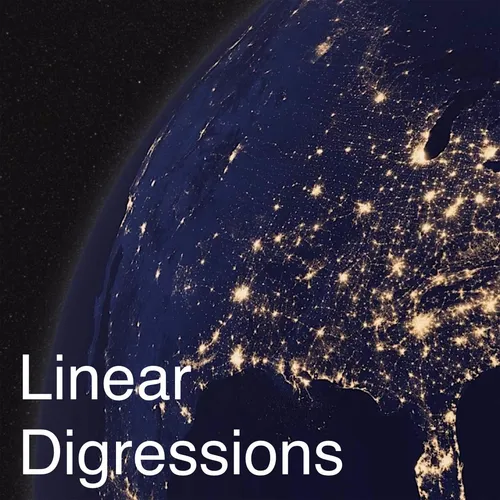
Linear Digressions
In each episode, your hosts explore machine learning and data science through interesting (and often very unusual) applications.
- Update frequency
- every 6 days
- Average duration
- 19 minutes
- Episodes
- 291
- Years Active
- 2014 - 2020

Heterogeneous Treatment Effects
When data scientists use a linear regression to look for causal relationships between a treatment and an outcome, what they’re usually finding is the so-called average treatment effect. In other word…
00:17:24 |
Sun 20 Jan 2019

Pre-training language models for natural language processing problems
When you build a model for natural language processing (NLP), such as a recurrent neural network, it helps a ton if you’re not starting from zero. In other words, if you can draw upon other datasets …
00:27:35 |
Mon 14 Jan 2019

Facial Recognition, Society, and the Law
Facial recognition being used in everyday life seemed far-off not too long ago. Increasingly, it’s being used and advanced widely and with increasing speed, which means that our technical capabilitie…
00:42:46 |
Mon 07 Jan 2019

Re-release: Word2Vec
Bringing you another old classic this week, as we gear up for 2019! See you next week with new content.
Word2Vec is probably the go-to algorithm for vectorizing text data these days. Which makes se…
00:17:59 |
Mon 31 Dec 2018

Re - Release: The Cold Start Problem
We’re taking a break for the holidays, chilling with the dog and an eggnog (Katie) and the cat and some spiced cider (Ben). Here’s an episode from a while back for you to enjoy. See you again in 2019…
00:15:37 |
Sun 23 Dec 2018

Convex (and non-convex) Optimization
Convex optimization is one of the keys to data science, both because some problems straight-up call for optimization solutions and because popular algorithms like a gradient descent solution to ordin…
00:20:00 |
Mon 17 Dec 2018

The Normal Distribution and the Central Limit Theorem
When you think about it, it’s pretty amazing that we can draw conclusions about huge populations, even the whole world, based on datasets that are comparatively very small (a few thousand, or a few h…
00:27:11 |
Sun 09 Dec 2018

Software 2.0
Neural nets are a way you can model a system, sure, but if you take a step back, squint, and tilt your head, they can also be called… software? Not in the sense that they’re written in code, but in t…
00:17:22 |
Sun 02 Dec 2018

Limitations of Deep Nets for Computer Vision
Deep neural nets have a deserved reputation as the best-in-breed solution for computer vision problems. But there are many aspects of human vision that we take for granted but where neural nets strug…
00:27:20 |
Sun 18 Nov 2018

Building Data Science Teams
At many places, data scientists don’t work solo anymore—it’s a team sport. But data science teams aren’t simply teams of data scientists working together. Instead, they’re usually cross-functional te…
00:25:09 |
Mon 12 Nov 2018

Optimized Optimized Web Crawling
Last week’s episode, about methods for optimized web crawling logic, left off on a bit of a cliffhanger: the data scientists had found a solution to the problem, but it wasn’t something that the engi…
00:19:42 |
Sun 04 Nov 2018

Optimized Web Crawling
Got a fun optimization problem for you this week! It’s a two-for-one: how do you optimize the web crawling logic of an operation like Google search so that the results are, on average, as up-to-date …
00:21:32 |
Sun 28 Oct 2018

Better Know a Distribution: The Poisson Distribution
The Poisson distribution is a probability distribution function used to for events that happen in time or space. It’s super handy because it’s pretty simple to use and is applicable for tons of thing…
00:31:51 |
Mon 22 Oct 2018

Searching for Datasets with Google
If you wanted to find a dataset of jokes, how would you do it? What about a dataset of podcast episodes? If your answer was “I’d try Google,” you might have been disappointed—Google is a great search…
00:19:54 |
Mon 15 Oct 2018

It's our fourth birthday
We started Linear Digressions 4 years ago… this isn’t a technical episode, just two buddies shooting the breeze about something we’ve somehow built together.
00:22:06 |
Mon 08 Oct 2018

Gigantic Searches in Particle Physics
This week, we’re dusting off the ol’ particle physics PhD to bring you an episode about ambitious new model-agnostic searches for new particles happening at CERN. Traditionally, new particles have be…
00:24:46 |
Sun 30 Sep 2018

Data Engineering
If you’re a data scientist, you know how important it is to keep your data orderly, clean, moving smoothly between different systems, well-documented… there’s a ton of work that goes into building an…
00:16:22 |
Mon 24 Sep 2018

Text Analysis for Guessing the NYTimes Op-Ed Author
A very intriguing op-ed was published in the NY Times recently, in which the author (a senior official in the Trump White House) claimed to be a minor saboteur of sorts, acting with his or her collea…
00:18:37 |
Sun 16 Sep 2018

The Three Types of Data Scientists, and What They Actually Do
If you've been in data science for more than a year or two, chances are you've noticed changes in the field as it's grown and matured. And if you're newer to the field, you may feel like there's a di…
00:23:25 |
Sun 09 Sep 2018

Agile Development for Data Scientists, Part 2: Where Modifications Help
There's just too much interesting stuff at the intersection of agile software development and data science for us to be able to cover it all in one episode, so this week we're picking up where we lef…
00:27:17 |
Sun 26 Aug 2018
Disclaimer: The podcast and artwork embedded on this page are the property of Ben Jaffe and Katie Malone ([email protected]). This content is not affiliated with or endorsed by eachpod.com.